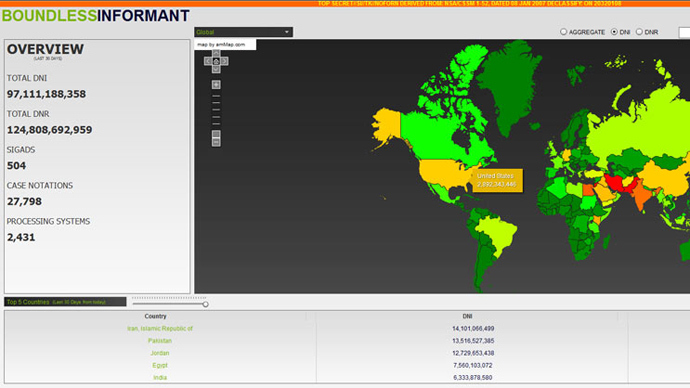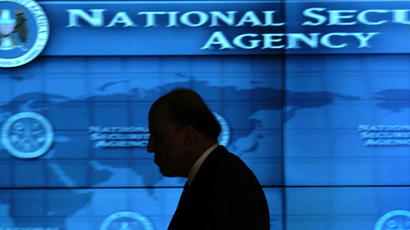Germany most-spied-on EU country by US - leaked NSA report

Germany appears to be the most snooped on EU country by the US, a map of secret surveillance activities by the National Security Agency (NSA) shows. EU officials are to question their US counterparts on data snooping in Europe.
The color-coded map of secret surveillance activities by the NSA ranks countries according to how much surveillance they are currently undergoing - green for the least and red for the most watched.
While all EU member states boast variant shades of green, Germany
stands out, color-coded orange.
The source behind the revelation of the top-secret NSA
surveillance program, already referred to as one of the most
significant intelligence leaks in US history, was uncovered late
last week. 29-year-old Snowden asked The Guardian to reveal his
identity, having fled to Hong Kong to escape retaliation by the
US authorities.
"The NSA has built an infrastructure that allows it to
intercept almost everything. With this capability, the vast
majority of human communications are automatically ingested
without targeting,” he told The Guardian.
“I, sitting at my desk, certainly had the authority to
wire-tap anyone … even if you are not doing anything wrong, you
are being watched and recorded,” he added.
The ‘Boundless Informant’ documents show NSA collecting up to 3
billion pieces of intelligence from US computer networks over a
30-day period ending in March 2013, according to The Guardian.
The tool reportedly allows users to select a country on a map,
view the metadata volume and select details about the collections
against this or that state.
Iran is on top of the surveillance list, with more than 14 billion data reports in March, while Pakistan came in a close second at 13.5 billion reports. Jordan, a close US ally, as well as Egypt and India are also near the top, according to the data.
Germany's Interior Ministry had already been in contact with US
officials to find out whether there had been any infringement of
German citizens' privacy lately. Chancellor Angela Merkel is due
to raise the issue of the NSA's eavesdropping on Germany with
President Barack Obama, who said the monitoring program is a
means of defense against terrorism.
"We need to step back here and say clearly: mass surveillance
is not what we want," Reuters quoted Jan Philipp Albrecht, a
German Green lawmaker in charge of overhauling the European
Union's outdated data protection laws as saying.
Asked whether the NSA’s surveillance scheme is already violating
the rights of EU citizens, German activist and theater director
Angela Richter tells RT that seems to be the case.
“As far as I can see from the Snowden leak, it seems to be
already happening, even if not officially. I’m very curious if
our governments knew already. I cannot imagine that surveillance
on this broad a scale could happen without anyone knowing [in the
EU],” says Richter.
As to why Germany appears to be the most closely surveilled
country within Europe, Richter believes that may go beyond
counterterrorism.
“I can only speculate. First of all, Germany is geographically
situated between East and West. Historically it was always the
case. On the other hand, Germany is strong economically within
Europe. There may be economic reasons, not only protection from
terrorists,” says Richter.
“The question is, is that ok? Even if 99 per cent of Americans
say it is ok for that to happen, it is still wrong,” she
adds.
EU rattled over US’ PRISM
The EU Parliament is considering a substantial overhaul of its
almost 20-year-old data protection rules, which when were
established without taking the internet into account.
"It is time we grasped the nettle here and put our minds to
ending the program," Reuters quoted Martin Ehrenhauser, an
Austrian independent member of the European Parliament, who was
referring to the SWIFT and the airline data agreements.
Both data-sharing deals between the European Union and the United
States were signed after the 9/11 attacks in 2001. The European
Parliament members sought at the time to limit the amount of data
that could be taken from European databases.
European officials attempted to negotiate an agreement that would
limit the US access to all types of sensitive European data,
however, not much progress was yielded.
Senior EU officials are expected to discuss the impact of NSA’s
programs on the privacy of EU citizens during a trans-Atlantic
ministerial meeting in Dublin on Thursday.
"This case shows that a clear legal framework for the protection
of personal data is not a luxury or constraint, but a fundamental
right," European Commissioner for Justice Viviane Reding
said.
The European Parliament said it is always firm on data protection
within the EU, as well as when negotiating with third countries,
including the US.
"It would be unacceptable and would need swift action from the EU
if indeed the US National Security Agency were processing
European data without permission," Guy Verhofstadt of the
parliament's liberal bloc said.
Reding said she would raise concerns in a meeting with US
Attorney General Eric Holder on Friday.
"This case shows why a clear legal framework for the
protection of personal data is not a luxury but a necessity,"
she tweeted.
Health Commissioner Tonio Borg said the EU wants a "clear
commitment" from the US to respect data-protection rights.
"The [Justice] Commission is asking for clear commitments from
the United States as to the respect of the fundamental right of
EU citizens to data protection," he said in a statement.
The EU wants clarity on whether the US authorized bulk transfers
of data, or only data on specific individuals.
The NSA's tradition of surveying international communities
reportedly goes back to the Cold War era, when the agency used
monitoring sites in Germany, Britain and other countries to spy
on communications within the Soviet Union and its East European
allies.
UK Foreign Secretary William Hague has meanwhile canceled his
trip to Washington to speak about The Guardian’s latest NSA
report.
He assured parliament that accusations that the UK government
allegedly used information provided by the Americans to
circumvent laws were "baseless."
"Our agencies practice and uphold UK law at all times," he
stated, "even when dealing with information from outside the
UK."
In an interview with the British newspaper, successful NSA
consultant Snowden leaked top-secret documents that revealed the
existence of the US National Security Agency’s extensive internet
spying program PRISM, which records digital communications and
allows for real-time online surveillance of US citizens. PRISM
gives US intelligence agencies direct access to files stored on
the servers of major internet companies, including Google and
Facebook, to identify and target potential terror suspects.
Meanwhile, the Swiss Foreign Ministry has requested the US
Embassy in Bern to clarify the role of Edward Snowden while he
served as a diplomat in Geneva.
"Switzerland expects members of diplomatic missions in Bern
and members of permanent missions in Geneva to respect the laws
and regulations of the state where they reside," it said in
an emailed statement.
Snowden, who leaked classified information to The Guardian about
the program, said he decided to make public his findings related
to PRISM after US intelligence reportedly attempted to recruit a
Swiss banker to obtain secret information.














